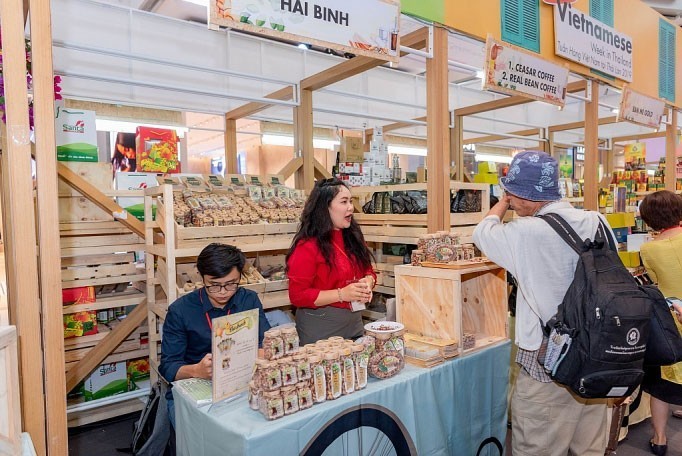According to the Head of the Vietnam Trade Office in Thailand Le Huu Phuc, the relationship between the two countries is bearing fruit. Since the establishment of the bilateral strategic partnership in 2013, two-way trade has increased by 230% from US $9.4 billion to US $21.6 billion in 2022. Last year, the figure reached almost US $19 billion.
At present, Thailand is Vietnam’s largest trading partner in the Association of Southeast Asian Nations (ASEAN), while the latter is the former’s No. 2 partner, after Malaysia.
 |
| Vietnamese pavilion at Vietnamese goods fair in Thailand. (Source: Ministry of Industry and Trade) |
Thailand now has more than 700 valid projects in Vietnam with a combined investment of nearly US $15 billion, ranking 9th among foreign investors in the country, VNS reported. Meanwhile, Vietnam’s investment in Thailand remains modest with a sum of US $32 million USD, focusing on consumer goods and distribution.
As both countries begin to develop new economic sectors such as green economy, circular economy, and renewable energy, the demand for cooperation between Vietnam and Thailand is continuously expanding. This will create new business opportunities.
In the near future, the Vietnam Trade Office in Thailand will promote local economic cooperation between the Northeastern provinces of Thailand, which are home to a large number of Vietnamese people, and the central provinces of Vietnam. Phuc emphasized that cooperation between these two regions can help Vietnam strengthen trade links with Thailand, particularly border trade via Laos; and facilitate access to each other’s market through local products under Thailand’s OTOP (One Tambon One Product) program and Vietnam’s OCOP (One Commune One Product).
Regarding supply chain connectivity, Phuc stated that the office will support Vietnamese businesses in finding and appointing agents and expanding their commercial presence in Thailand, while introducing and bringing Vietnamese goods to Thai supermarkets through partnerships with major supermarket chains in the country, such as Central, Marko, and TCC.
He added that the office will also facilitate and enhance industrial collaboration, particularly in the automotive sector, by identifying and connecting manufacturers of component parts and accessories.








